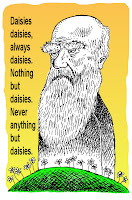 Charles Robert Darwin went to meet his Maker on April 19, 1882, in Downe, England. Upon his death, Darwin's family arranged for him to be buried in St. Mary's churchyard in the village of Downe. However, William Spottiswoode, the President of the Royal Society wrote to the Dean of Westminster Abbey requesting that Darwin be buried in its prestigious cemetery. Darwin once wrote:
Charles Robert Darwin went to meet his Maker on April 19, 1882, in Downe, England. Upon his death, Darwin's family arranged for him to be buried in St. Mary's churchyard in the village of Downe. However, William Spottiswoode, the President of the Royal Society wrote to the Dean of Westminster Abbey requesting that Darwin be buried in its prestigious cemetery. Darwin once wrote:
"I feel most deeply that the whole subject is too profound for human intellect. A dog might as well speculate on the mind of Newton."
It’s interesting that Darwin spoke of the mind of Newton. Here is what Newton said about God:
"Repentance and the remission of sins relate to transgressions against the two first Commandments. We are to forsake the Devil, that is, all false gods and all manner of idolatry, this being a breach of the first and great commandment. And we are to forsake the flesh and the world, or as the Apostle John expressed it, the lust of the flesh and the lust of the eye and the pride of life, that is, unchastity, covetousness, pride and ambition; these things being a breach of the second of the two great Commandments. And we are to believe in one God, the father, almighty in dominion, the Maker of heaven and earth and of all things therein, and in our Lord Jesus Christ, the son of God, who was born of a Virgin and sacrificed for us on the cross, and the third day rose again from the dead and ascended unto heaven...And as for the Christian worship, we are authorized in scripture to give glory and honor to God the Father, because he hath created all things, and to the Lamb of God, because he hath redeemed us with his blood and is our Lord, and to direct our prayers to God the Father in the name of Christ ..."
Ironically, Charles Darwin is buried in Westminster Abbey, close to Sir Isaac Newton.
Wednesday, December 3, 2008
Creation--Too Profound
Posted by
Ray Comfort
on
12/03/2008 05:16:00 PM
![]()
Creation--Too Profound
2008-12-03T17:16:00-08:00
Ray Comfort







